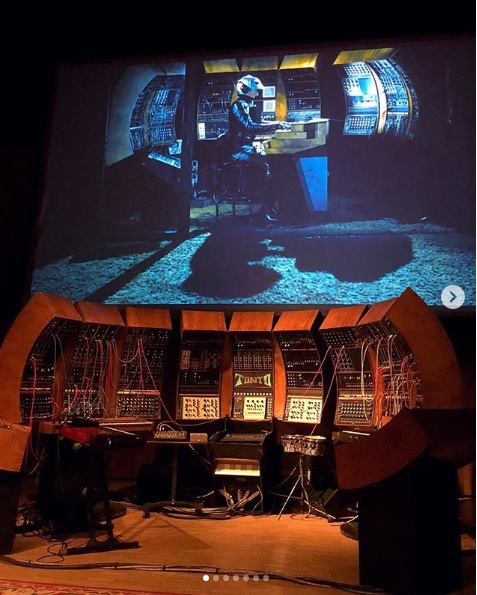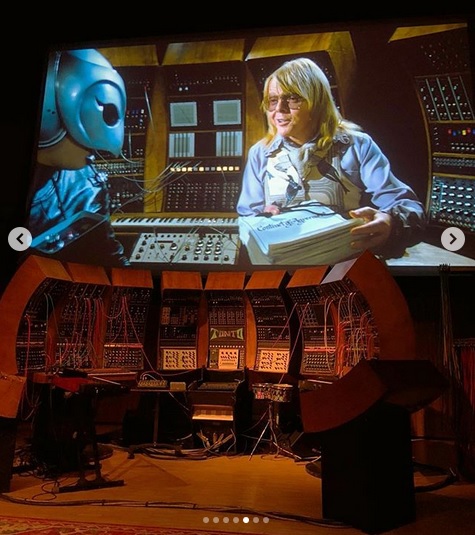RESTORATION LED TO SAT. NIGHT SCREENING OF DE PALMA FILM IN CALGARY

"Once upon a time," Devo's Mark Mothersbaugh has said, "TONTO represented the cutting edge of artificial intelligence in the world of music." Created 50 years ago in 1968 by Malcom Cecil and Robert Margouleff, TONTO was and remains the largest synthesizer in the world, according to the National Music Center (NMC), which has just completed a restoration of the instrument. Winslow is seen prominently playing TONTO in Brian De Palma's Phantom Of The Paradise, although, as mentioned on The Swan Archives' Production page, we do not "hear sounds actually generated by TONTO in the film, where it's used only for its striking appearance."
TONTO is further described at The Swan Archives:
"It's a Series III Moog modular synthesizer, which Cecil expanded with modules from Moog, Arp, Oberheim, and others. It was used by Stevie Wonder on several albums, and is also heard on records by Quincy Jones, Bobby Womack, The Isley Brothers, Gil Scott-Heron and Weather Report, Steven Stills, The Doobie Brothers, Dave Mason, Little Feat, and Joan Baez. All those dials and jacks on the walls are actually part of the thing, and not some set-designer's fantasy."

"In 2013, the National Music Centre (NMC) acquired TONTO for their working musical instrument collection and the famous synthesizer was moved to Calgary to be restored for use," Beatroute's David Daley wrote ahead of TONTO Week. He continued:
In conjunction with the Alberta Electronic Music Festival, NMC is celebrating the completion of TONTO’s restoration with TONTO week, a series of events running November 14-18 that includes which include a rare screening of the cult film that helped make TONTO famous.The Phantom of the Paradise is many things at once: a mind-bending horror film, rock opera, tragedy, love story, comedy and a cautionary tale for us mere mortals. There’s a reason why the movie ran almost constantly for a year in Winnipeg after it first opened and has earned permanent die-hard cult status around the world: it’s a damn good film.
Legendary director Brian DePalma both wrote and directed the story, drawing from the classic tales of Faust, The Phantom of the Opera and The Picture of Dorian Grey. Rod Serling of the surreal TV show The Twilight Zone narrates an eerie introduction explaining how the music mogul Swan seeks the music to open his new rock palace “the Paradise” with: “..this film is the story of that search, of that sound, of the man who made it, the girl who sang it and the monster who stole it.”
Winslow Leach is a brilliant composer. Swan steals his masterpiece cantata and sends him to jail on false charges. Leach escapes from prison and is horribly injured and believed dead after he tries to destroy the pop-music pressings of the music swan stole from him. Things heat up when a lurking phantom kills the Paradise’s opening act “Beef” in a horrible onstage spectacle. The story get even stranger after that.
The diminutive Paul Williams (who also plays Swan in the film) wrote the music and lyrics for the soundtrack at the height of his song-writing career and each tune is quite successful on its own. Blistering rock performances by Swan’s musical incantation “The Undead” leave more than a few people chopped up afterwards. The chanteuse Phoenix sings a hauntingly beautiful love ballad after Beef is cooked alive onstage. Immediately an instant star, Phoenix is seduced by Swan which creates a love-triangle that doesn’t end well at all.
Don’t be thrown off by the movie’s campy 1970s aesthetic or apparent simplicity, this is a film lover’s film of the highest order with strong visual symbolism and a rich sub-text. It’s a dark parody and venomous critique of the star-making schemes of greedy producers and well worth seeing on the big screen. Love and death, hope and despair, doom and redemption all await the viewer in this unique rock and roll horror phantasy.
FURTHER READING:
It was during that same period that TONTO had its Hollywood close-up. TONTO and Record Plant Studio B are featured in several key scenes in Brian De Palma’s 1974 cult movie Phantom of the Paradise, in which a Phil Spector–like producer (Paul Williams), imprisons and drugs a tormented Phantom (of the Rock Opera) composer until he completes his rock cantata. For fans like Rod Warkentin, organizer of Winnipeg, Canada’s annual Phantompalooza festival and Facebook page, “TONTO is like another character in the movie.” Following the film’s storyline in which the Phantom’s composition is purloined by its producer, Cecil was never paid for the use of TONTO, based on an unfulfilled promise that he could contribute to the movie’s score.
Updated: Wednesday, November 21, 2018 5:46 PM CST
Post Comment | Permalink | Share This Post



